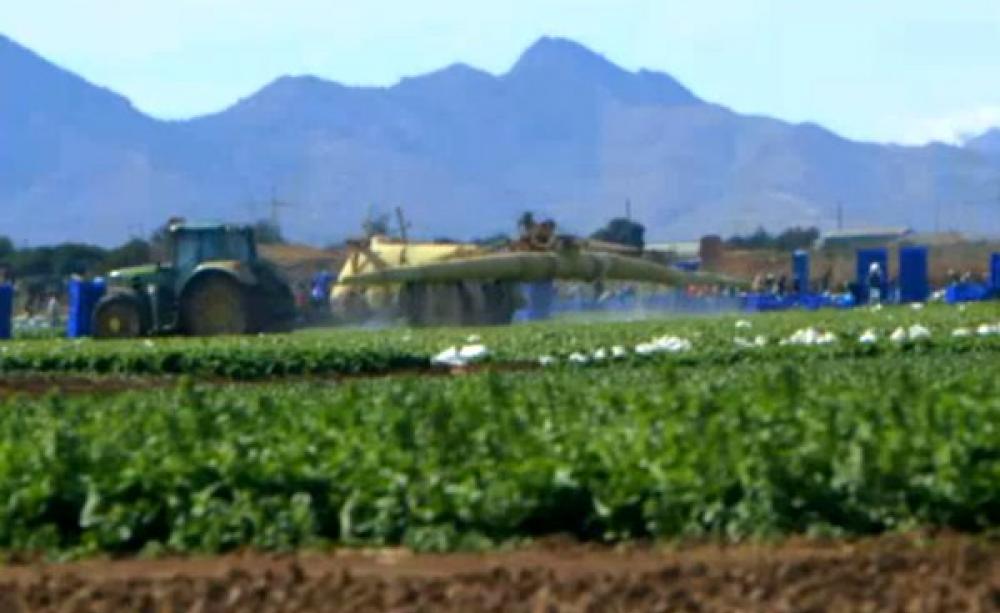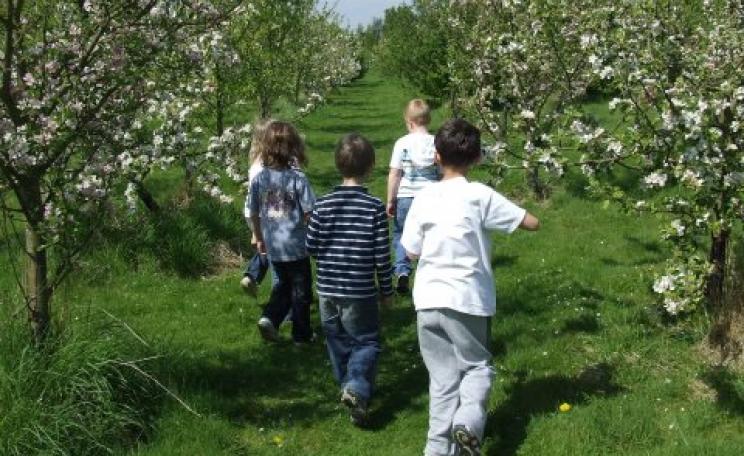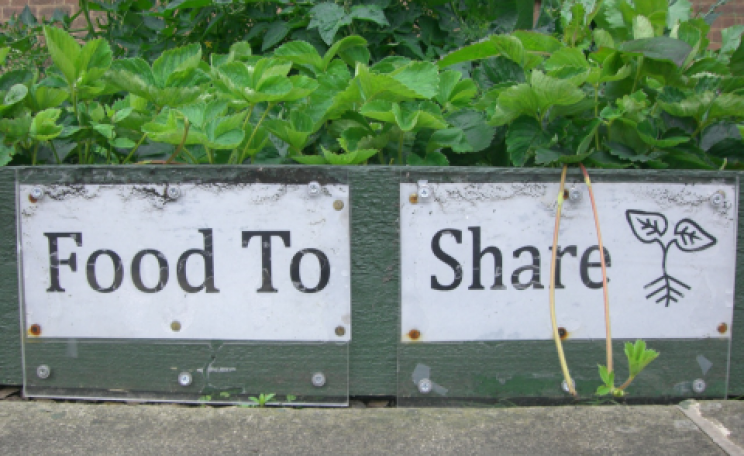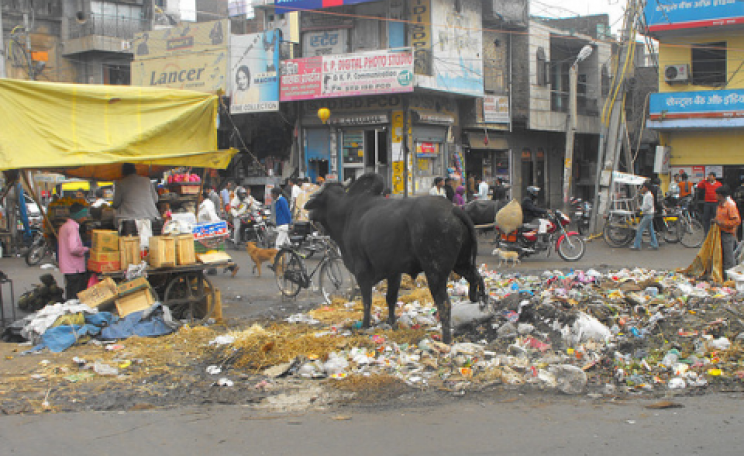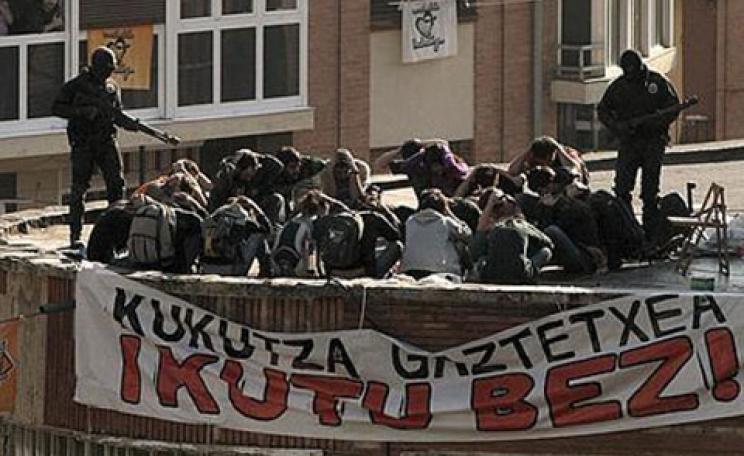They are human beings that have come, that have crossed the ocean and the sea to come and work and make a living, they have come out of the third world to end up in the fourth world.
Organic or not, the truth is that a lot of the salad products found in British supermarkets come from fields in Southern Spain, where migrants work from dusk till dawn in appalling working conditions, which they describe as 'semi-slavery'.
They are treated illegally by the agencies who employ them to meet our growing demand for fresh products, from field to fork.
Whilst she talks she clutches her hands to her chest in pain. Iman looks around worried that someone may see her with us. She holds her inhaler and suggests to go inside a bar because the wind makes it difficult for her to breathe.
Inside she tells us that two years ago she fell ill after working in a field which was being sprayed with pesticides whilst working in Murcia for an agency which supplies labour to companies which have licenses to produce salad for British supermarkets.
Since then, her life has been hell she claims: "Nobody is helping me, I cannot breathe. I hope god will help me!"
Despite the existence of strict regulations for companies which pick for UK supermarkets, on the ground I watched tractors spray lettuce crops with pesticides in the fields whilst groups of workers hurried to pick lettuce as quickly as they can with no protective gear at all, bar a flimsy scarf wrapped around the face at best.
Another worker we spoke to, Mohamed, was hospitalized after - he alleges - suffering from pesticide poisoning in a field two days after we interviewed him. Mohamed was fired that same week after he complained.
Video: Part 1 of the C4N / Ecologist Film Unit investigation.
Both Iman and Mohamed worked for a temporary work agency called Integra Empleo. Agroherni hired workers through this agency producing for UK supermarkets. Now it has begun an internal investigation and has since stopped working with Integra Empleo after admitting that they had never been aware of such allegations.
When approached with the worker's complaints, the director of the company Integra Empleo, Juan De Dios, said that "the company follows rigorously the legal demands which concern us."
But the problem doesn't stop with one agency alone, says Abderrezzak Drioua, coordinator of a local NGO Murica Acoge, which protects agricultural worker rights. "It is common for big companies to hire agencies..which are exploiting workers here. It is becoming a massive problem. There are more than 40 of such agencies operating in this area."
A very dodgy payment system
Workers we spoke to allege that they are paid 'by the box', instead of by the hour and earning a fixed sum, as it is indicated in their contract.
This makes the payment illegal and forces them to work extra hours and with no rest days for months to be able to cope with demand and pick as much as they can to make ends meet. The Ecologist viewed one such contract and the contrasting calculations of Mohamed alongside it.
They are human beings that have come, that have crossed the ocean and the sea to come and work and make a living, they have come out of the third world to end up in the fourth world.
"We work on Sunday's, and sometimes 17, 16, 15 hours and we don't get paid for some of the extra hours we do", says Mohamed. "We get paid around 3 euros an hour, and every month, there is money missing."
He shows us a registry of his payments for December and January where five working days each month are not counted in the final pay.
Abderrezzak tells us that the so-called box payment system crept into use a few years ago when the economic crisis swept through Spain. The Southern regions were the worst hit, and it has created worsening conflict. Pitting vulnerable workers against companies who claim that the crisis is responsible for these changes.
"The machines are working at full speed. We are forced to work really quickly because the order from abroad is growing. For this reason many of us have had operations in hour hands because the speed we have to work...it's just impossible", says Tita another woman we spoke to who works for another major UK supermarket supplier.
Now Abderrazak, Mohamed and other fellow Maroccan companions are trying to put together all the evidence needed to confront these agencies which its claimed are exploiting workers in the region. It's a David versus Goliath task.
The rule of silence
Last month around 5000 migrant workers from Africa, Asia, Latin America and South East Europe flooded the streets of Murcia in demonstration demanding rights at work under the shout of 'we want agencies out!'.
Union flags and home made banners, waved in the air through the tense march, but despite the endless lines of workers screaming for help in the hot sun, there was barely a journalist around. After the march, the workers vanished leaving only a dead silence behind, as it nobody had heard them.
"If we complain, we get sacked", says Mohamed. It is as simple as that, as he recently suffered it himself. His friend Youssef, alleges that he was also sacked a few months ago after complaining about his working conditions. "It's common knowledge that it's best to keep quiet."
"It's a corrupt system where everyone seems to be involved from the syndicates, to the companies and the government", says Abderazzek. We spoke to numerous people all of whom claim that the working inspections rarely if ever visited their workplace and never asked them about conditions.
Video: Part 2 of the C4N / Ecologist Film Unit investigation.
Working inside a plastic city
A few hours East of this region, in the province of Almeria, we arrive at El Ejido, the so-called plastic city which can be seen from outer space.
This area limits with the British tourist haunt of Costa del Sol, where those roasting on the beaches under the sun would scarcely imagine what is going on a few kilometres away, under a sea of plastic.
It looks abandoned but inside this ghostly maze there is an army of invisible workers who pick fruit and vegetables all day hidden under tarpaulin that can reach as hot as 50 degrees in summertime.
Working conditions here are even worse. Hassan works for a large courgette grower supplying the UK and Northern European market. Inside the greenhouse where he works, he told us that there is no ventilation: "The door, the windows ... everything is closed."
He also says that there are no sanitary facilities and that they have to leave the greenhouse to defecate in the open and clean themselves with stones. When inspectors come toilets are cleaned and provided with toilet basics. Workers are also provided with better working tools and gear. Once the inspection leaves, it's back to normal again.
On top of that, workers can go on without being paid for months, he says: "Sometimes we reach three months without being paid. Right now we haven't been paid for two months."
He also suffers from pesticide exposure, and wears hardly any protection, which he has to buy himself. "In the face we have a mask that costs 60 cents. This is not sufficient to protect us."
He also shows us his goggles - bought from the local corner shop, they would look more at home in world War 1 trench: "You have the obligation to work with sulphur. The problem is that the sulphur covers all your face and gets in your eyes every day."
In his workplace, he alleges, if employees complain they are blacklisted in what his boss called a registry of "rotten sardines". Those in the list are forced to work harder, pushing around heavier trolleys and, if they keep complaining they are eventually sacked.
Hassan puts up with it because he has 4 children in his care and as an immigrant he needs to work in order to secure his residence in the country.
No papers, no rights
But, incredibly perhaps, Ahmed considers himself one of the lucky ones. Here in Almeria many of the immigrants are undocumented so they are exposed to abuse as they fear being expelled back to the countries they struggled so hard to leave.
"There are around 120,000 workers inside these greenhouse and approximately 80,000 have no papers, so hardly any rights", explains Spitou Mendy, a Senegalese working at a Spanish Field Workers Syndicate (SOC)
Spitou Mendy arrived in Spain from Senegal in the year 2000 as an undocumented immigrant himself and worked in the fields for five years until he joined the syndicate. He explains how the farms work:
"The system needs a labour force in sufficient numbers, and that this working force has no qualification, no residence permit, and - afraid of expulsion - are obliged to lower their head, work like slaves and produce for supermarkets."
As we turn the corner we see Africans waiting at a roundabout hoping to be picked up by a farmer and taken to work, an illegal practice in Spain.
Sadi, from Mali, waits all day at this roundabout every day from 6 in the morning. He is only 20 years old and has fled war in Mali, crossed half of Africa and reached Europe by boat to end up here, waiting at this roundabout to get a job. So far he's waiting in vain.
"When I find work for a day or two, I get paid €32 or €33 per day, while Spanish people get €50 or more for a day's work", he says.
He lives in a small house with three people from Mali, three from Senegal, two from Burkina Faso and one from Gambia. None of them speak Spanish well so they are even more vulnerable.
Habitants of the maze
Mendy guides us to self made shacks where a group of Marrocan women live locked up amongst greenhouses full of food ready to be exported, whilst they hardly have anything to eat.
Fatima cries as she tells us that she hasn't seen her children in 8 years. She suffers from severe headaches and unable to work, she is stuck in this alien place.
A friend fetches food for her from the nearest village, as it is hard to get access to the outside world. Fatima Zohra El Halloufi lives in the middle of plastic tunnels which are locked behind gates to prevent anyone from stealing food from the greenhouses. Only a few have access to the key.
The shack she lives in has no water or electricity, she says: "We live here in deep misery ... we live here without work, without food, I have documentation but no work. We live here like locked in sheep, like pigs. like pigs, locked in here! They don't open the door for us. If you want to buy a loaf of bread they don't open the door for you to leave."
Who is to blame?
The responsibility of what happens here is diluted between big companies, the government, farmers and supermarkets. According to a small farmer working in the province of Almeria, Jose Antonio Roldán Oliva,
"The crisis is not to blame, it is the growing demand and the rise in production costs. This way farmers choose to save on working force, salaries and paying social security to be able to invest more in seeds and fertilizers."
It is hard to imagine that our salad bowls can contain so much suffering. Big supermarkets chains need to ensure that the way our food is produced is ethical and legal. There is a need to re-think our consumer habits, transparency and certification.
"The consumer that eats a product worked by human people, has to look to see in what conditions", says Mendy. "They are human beings that have come, that have crossed the ocean and the sea to come and work and make a living, they have come out of the third world to end up in the fourth world."
All this whilst people all over Europe much away unaware of the real cost of their food.
Almudena Serpis is an activist and journalist who has worked in numerous magazines, newspapers and websites in Madrid, London and Amsterdam, and on assignments with the Ecologist Film Unit. Her research and investigations evolve around social movements, feminism and ecology. She is also a trained nutritionist.
This article reflects the findings of a joint investigation of The Ecologist Film Unit and Channel 4 News. Part 1 of the investigation was broadcast on 15 April 2015 (view on video embed, above), and Part 2 is scheduled for broadcast tonight, 16th April.
Author's note: All the names of the workers we spoke to have been changed to protect their identity.

